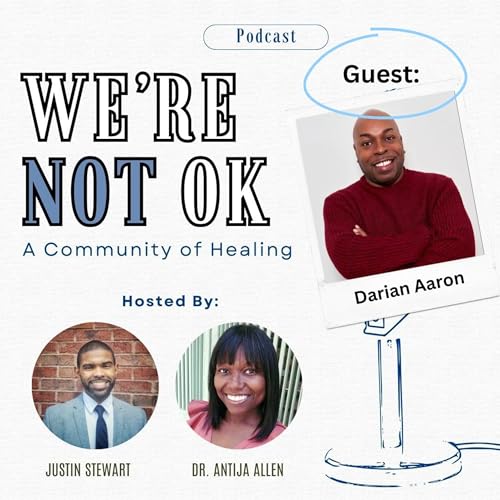
Darian Aaron: GLAAD Down South
カートのアイテムが多すぎます
カートに追加できませんでした。
ウィッシュリストに追加できませんでした。
ほしい物リストの削除に失敗しました。
ポッドキャストのフォローに失敗しました
ポッドキャストのフォロー解除に失敗しました
-
ナレーター:
-
著者:
このコンテンツについて
In this episode of We’re Not OK: A Community of Healing, we welcome Darian Aaron—a multi-award-winning journalist, newsroom leader, and narrative shifter with nearly two decades of experience.
As the Director of Local News: US South at GLAAD and founder of GLAAD Down South, Darian is leading the fight to amplify Black queer voices and confront some of today’s most urgent battles—discriminatory laws in the South, harmful media narratives, and the erasure of LGBTQ people of color.
Darian’s impact also extends through interviews with cultural icons including Billy Porter, Lena Waithe, Uzo Aduba, and Wanda Sykes—further proof of his undeniable influence on media and culture. From making history as the first African-American Editor-in-Chief of Georgia Voice to earning national recognition for his storytelling, Darian’s career is a testament to the power of representation.
Tune in for a powerful conversation on advocacy, visibility, and healing—and join us in amplifying the voices that matter most.
Connect with Darian Aaron using his social handle on all platforms: @darianoutloud
GLAAD Resource: GLAAD Media Reference Guide 11th Edition
SouthernShowcase: GLAAD Elevates and Celebrates Black Queer and Trans Stories withDedicated Director of Local News and ‘GLAAD Down South’ LGBTQ Media Event
Connect with us:
Follow @notokbookproject
Follow @thenotokpodcast
Follow @antijaallen
Follow @justwrite_stewart87
Content warning: This episode contains discussion of suicide. "Ifyou or someone you know is in crisis, call or text the 988 Suicide & Crisis Lifeline at 988 (para ayuda en español, llame al 988). The Lifeline provides 24-hour, confidential support to anyone in suicidal crisis or emotional distress. Call 911 in life-threatening situations. If you are worried about a friend’s social media updates, you can contact safety teams at the social media company . They have processes to reach out to connect the person with the help they need."



